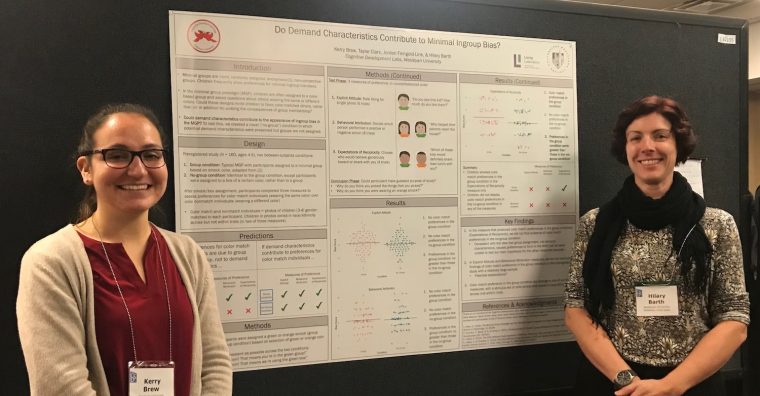Hilary Barth, professor of psychology; Andrea Patalano, professor of psychology; Liana Mathias '17; and former lab coordinators Alexandra Zax and Katherine Williams are the co-authors of an article titled "Intuitive symbolic magnitude judgments and decision making under risk in adults," published in Cognitive Psychology, 118, in May 2020. Barth; Williams; postdoctoral fellow Chenmu Xing; Jamie Hom '17, MA '18, Meghana Kandlur '18, Praise Owoyemi '18, Joanna Paul '18, Elizabeth Shackney '17, and Ray Alexander '18 are the co-authors of "Partition dependence in financial aid distribution to income categories," published in PLoS ONE 15, in April 2020. Barth; Patalano; Williams; Zax;…
This month, four Wesleyan faculty received the honorary degree of Master of Arts ad eundem gradum. This degree has been awarded by Wesleyan since 1894 to those members of the faculty who are not graduates of Wesleyan at the bachelor’s level and who have attained the rank of full professor. The award makes each full professor an alumnus/a of the University. Recipients include Hilary Barth, professor of psychology; Robert Conn, professor of Spanish; Sanford Shieh, professor of philosophy, and Nicole Stanton, professor of dance.
Hilary Barth, professor of psychology; Andrea Patalano, professor of psychology; Joanna Paul '18; and former postdoctoral fellow Chenmu (Julia) Xing are co-authors of a paper titled "Probability range and probability distortion in a gambling task," published in Acta Psychologica in June 2019. Barth and Emily Slusser, a former postdoctoral fellow, are the co-authors of a paper titled "Spontaneous partitioning and proportion estimation in children’s numerical judgments," published in the Journal of Experimental Child Psychology in September 2019. Barth; Patalano; Slusser; Alexandra Zax, visiting scholar in psychology; and Katherine Williams, lab coordinator; are the co-authors of a paper titled "What Do…
Numerous students, alumni, and faculty from Wesleyan's Cognitive Development Labs recently presented their research at the 2019 Cognitive Development Society biennial meeting, held Oct. 17–19 in Louisville, Ky. The labs are led by Professor of Psychology Hilary Barth and Associate Professor of Psychology Anna Shusterman. Barth and Kerry Brew '18, MA '19 presented their poster, "Do Demand Characteristics Contribute to Minimal Ingroup Bias?" The work was done in collaboration with lab alumni Taylar Clark '19 and Jordan Feingold-Link '18. Sophie Charles '20, lab coordinator Katherine Williams, and former lab coordinator Alexandra Zax presented their poster, "The Role of Digit Identity…
Hilary Barth and Andrea Patalano, both professors of psychology, have received a major grant from the National Science Foundation (NSF) to support collaborative research on numerical cognition. The three-year $1,091,303 grant, which is funded by NSF’s EHR Core Research program focused on STEM learning, includes support for Wesleyan student participation in the proposed research project, which will involve experimental studies of children’s and adults’ understanding of, and judgments about, number and quantity. The two labs collaborate frequently, and have been working jointly on another project for the past three years supported by an earlier NSF grant. The new project is distinct,…
Hilary Barth, associate professor of psychology, is a co-author of a paper titled, “How feedback improves children’s numerical estimation,” published in the August 2016 issue of the journal Psychonomic Bulletin and Review. Barth’s co-authors are former members of her Cognitive Development Lab, which include Shipra Kanjlia ’11 and Jennifer Garcia ’10, former lab managers Jessica Taggart and Elizabeth Chase, and former postdoctoral fellow Emily Slusser, PhD. The paper explores one theory of children’s cognitive development that there are fundamental developmental changes in the ways children think about numbers. This theory says numbers are arranged on a different mental scale for younger…
Hilary Barth, associate professor of psychology, is the co-author of an article titled "Spatial Estimation: A Non-Bayesian Alternative," published in Developmental Science, Volume 18, pages 853-862, in 2015. The paper is co-authored by Ellen Lesser ’15, as well as former Cognitive Development Labs coordinator Jessica Taggart and former postdoctoral fellow Emily Slusser. A large collection of estimation phenomena (for example, biases arising when adults or children estimate remembered locations of objects in bounded spaces) are commonly explained in terms of complex Bayesian models. Bayesian cognitive models seek to model human mental processes as approximations to ideal statistical inference. In this study, Barth and…
A partnership between Wesleyan’s Cognitive Development Labs and the Connecticut Science Center recently received a $3,000 Partner Stipend from the National Living Laboratory® Initiative, which receives support from the National Science Foundation. The Cognitive Development Labs received an additional $1,000 Educational Assistance stipend. Hilary Barth, associate professor of psychology, oversees the Living Laboratory® site located at the Connecticut Science Center. Since 2013, researchers from Barth’s lab have been visiting the museum on Saturdays to collect data for current studies, speak with children and families about child developmental research, and guide visitors through hands-on activities that demonstrate important findings in developmental psychology. The National Living Laboratory® Initiative Partner Stipend…
Wesleyan was strongly represented by faculty, undergraduates and alumni at the Biennial Meeting of the Society for Research in Child Development, the major conference in the field. The meeting was held in Philadelphia, Pa. March 19-21. Members of the Cognitive Development Labs, co-directed by Associate Professor of Psychology Anna Shusterman and Associate Professor of Psychology Hilary Barth, presented research at the conference. Former lab coordinator Jessica Taggart presented work done with Jillian Roberts '15, current lab coordinator Lonnie Bass, and Barth titled, "Minimal group membership and children's ideas of equality." This is Roberts' senior thesis project. Andrew Ribner '14 presented his senior thesis, "Preschool…
Hilary Barth, associate professor of psychology, associate professor of neuroscience and behavior, is the co-author of of "Preschoolers trust novel members of accurate speakers’ groups and judge them favorably," published in the Quarterly Journal of Experimental Psychology, Issue 67, pages 872-883, in 2014. The paper is based on work from BA '08/MA '09 student Keera Bhandari's thesis, and research by former undergraduates Kyle MacDonald '10 and Jenn Garcia '10, and former lab manager Elizabeth Chase. It is known that by age 3, children track a speaker's record of past accuracy and use it as a cue to current reliability. Through two different experiments,…
Jillian Roberts ’15 presented a poster at the Annual Meeting of the Eastern Psychological Association in Boston, Mass. on March 15. The poster, titled "Influence of minimal group membership on children’s ideas of equality," is co-authored by Jessica Taggart, research associate and Psychology Department lab coordinator, and Hilary Barth, associate professor of psychology, associate professor of neuroscience and behavior. Roberts developed the project herself and has conducted the research over the past two years.
Wesleyan’s Cognitive Development Labs are bringing their research on how young children think and learn to local museum visitors, thanks to a new partnership with the Connecticut Science Center in Hartford. The partnership provides the public with a rare opportunity to learn about child development and psychological science—topics not often represented at science museums—at the Connecticut Science Center, while allowing the Wesleyan researchers access to a wide pool of subjects to include in their studies. “It’s basically bringing the lab research out into the public, making the science accessible to kids and families, and also collecting data in the process,”…




